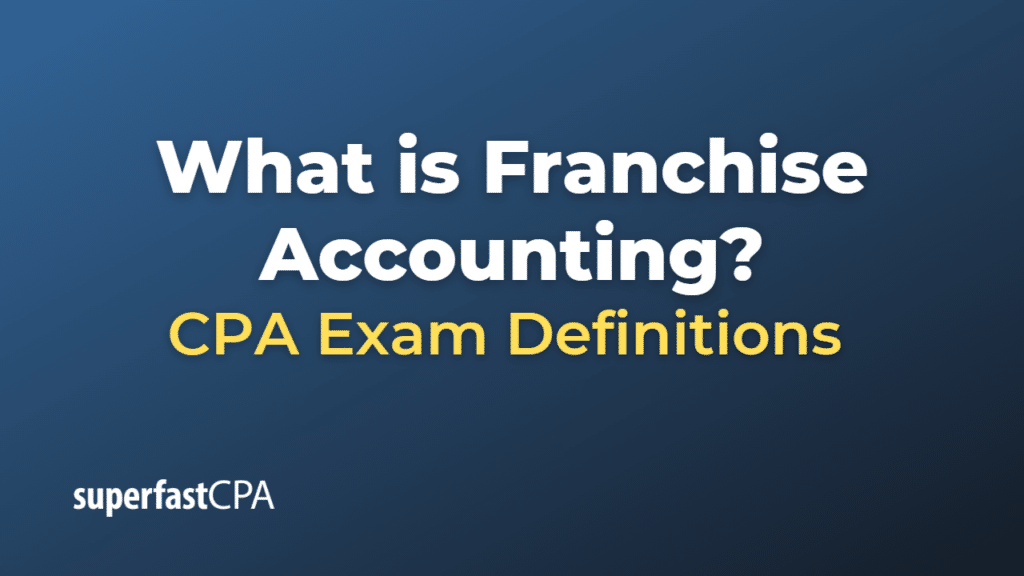Franchise Accounting
Franchise accounting involves the specific methods of handling financial matters within the unique business model of a franchise. Given the nature of the franchisor-franchisee relationship, certain aspects of accounting are particular to franchises.
Here are the key components of franchise accounting:
- franchise Fee: When a franchisee purchases a franchise, they pay an initial franchise fee. For the franchisor, this is recognized as revenue. However, it is not all recognized at once. Accounting standards typically require the franchisor to recognize this revenue over the life of the franchise agreement, which could be many years.
- Ongoing Royalties: Franchisees typically pay ongoing royalties to the franchisor, based on a percentage of their sales. These royalties are recognized as revenue by the franchisor and an expense by the franchisee.
- Advertising Fees: Franchisees often contribute to a collective fund used by the franchisor for brand-wide marketing efforts. These funds must be accounted for separately by the franchisor and typically cannot be recognized as revenue, as they’re meant to be used for the benefit of the entire franchise system.
- Inventory and Supplies: In many franchise systems, franchisees are required to purchase certain inventory or supplies from the franchisor or approved vendors. These transactions need to be properly tracked and accounted for.
- Fixed Assets: The franchisee usually invests in fixed assets like leasehold improvements, furniture, fixtures, and equipment. The cost of these assets is capitalized and then depreciated over their useful lives.
- Operating Expenses: Like any other business, franchises have operating expenses such as rent, salaries, utilities, insurance, and taxes. These need to be accounted for accurately to maintain the financial health of the business.
Franchise accounting can be complex due to the nature of the franchisor-franchisee relationship and the various financial flows between them. Franchisors and franchisees may need to work with accountants or use specialized accounting software that is specifically designed to handle the unique requirements of franchise businesses.
Moreover, as with all accounting practices, franchise accounting must comply with Generally Accepted Accounting Principles (GAAP) and any other applicable local, state, or federal regulations.
Example of Franchise Accounting
Let’s take a closer look at how some of these elements might work in practice.
Let’s say you purchase a franchise of a popular coffee shop brand. You pay an initial franchise fee of $50,000. This gives you the right to operate your coffee shop under the brand’s name for ten years.
From the franchisor’s perspective, this $50,000 is revenue, but they can’t recognize it all at once. Instead, according to Generally Accepted Accounting Principles (GAAP), they must recognize it over the life of the franchise agreement. So, each year for the next ten years, they would recognize $5,000 ($50,000 divided by 10 years) of that initial franchise fee as revenue.
Now, let’s say your coffee shop is up and running, and you’re making sales. As part of your franchise agreement, you’re required to pay the franchisor a royalty of 6% of your gross sales. If your coffee shop makes $500,000 in sales in the first year, you would owe the franchisor $30,000 in royalties ($500,000 times 6%). For you, this $30,000 is an expense. For the franchisor, it’s additional revenue.
Additionally, as part of your franchise agreement, you contribute 2% of your gross sales to the brand’s advertising fund. This would be another $10,000 ($500,000 times 2%). However, unlike the royalties, the franchisor can’t simply recognize this $10,000 as revenue. Instead, they must use it to fund marketing efforts that benefit the entire franchise system.
Meanwhile, you have other expenses to account for. You’re paying for inventory (coffee beans, milk, pastries, etc.), salaries for your staff, rent for your coffee shop location, and other operating expenses. These all need to be accurately tracked and accounted for to understand the financial health of your business.
Over time, you’ll also need to account for the depreciation of your coffee shop’s assets. For example, let’s say you spent $100,000 outfitting your coffee shop with furniture, fixtures, and espresso machines. You can’t deduct this entire cost in the first year. Instead, you’ll need to spread it out over the expected useful life of these assets, deducting a portion of the cost each year as depreciation.
This is a simplified example, but it gives you an idea of how franchise accounting works. There can be additional complexities, especially for larger franchise systems or for franchisees who own multiple locations.













